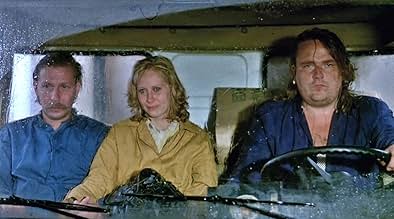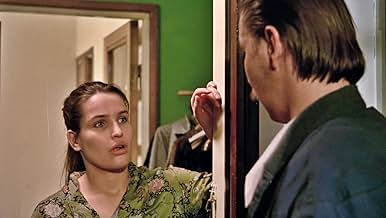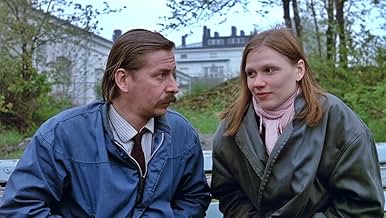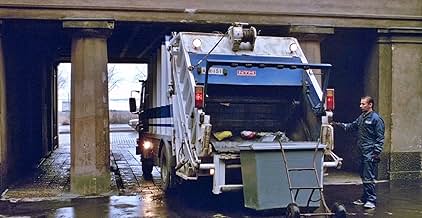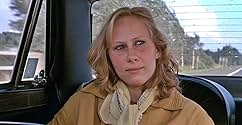ÉVALUATION IMDb
7,5/10
7,7 k
MA NOTE
Ajouter une intrigue dans votre langueAn episode in the life of Nikander, a garbage man, involving the death of a coworker, a love affair and much more.An episode in the life of Nikander, a garbage man, involving the death of a coworker, a love affair and much more.An episode in the life of Nikander, a garbage man, involving the death of a coworker, a love affair and much more.
- Prix
- 1 victoire au total
Safka Pekkonen
- Pianist
- (as Safka)
Mato Valtonen
- Pelle
- (as Markku Valtonen)
Sakke Järvenpää
- Staffan
- (as Sakari Järvenpää)
Histoire
Le saviez-vous
- AnecdotesTowards the end, there's a scene where Nikander's friend talks about a problematic fellow worker named Mikkonen. Matti Pellonpää, who plays Nikander here, would later play Mikkonen in Ariel (1988), the second part of the Proletariat trilogy directed by Aki Kaurismäki.
- GaffesWhen Nikander and Ilona leave the gas station and ride down the road, they pass a white car. The white car is standing still in the middle of the road. Presumably they drove so fast that they passed the white car, but it stands still.
- ConnexionsFeatured in Century of Cinema: Scandinavie, Stig Björkman (1995)
- Bandes originalesHerbstlaub
Written by Klaus Treuheit
Performed by Klaus Treuheit
Commentaire en vedette
There's an almost silent film like quality to much of Kaurismäki's work, with that notion of a cinema of images that works without the extraneous use of dialogue or the broader notions of exposition. What this results in is a style of film-making in which the most simple of images tells a story. Simplicity is essentially the key to this film; not simply within the set up, in which a bin man begins a furtive relationship with a supermarket checkout girl, but in the presentation of the film itself. Some critics have used worlds like minimalist or unassuming when discussing the films of Kaurismäki, and in particular, his early trilogy of films, of which Shadows in Paradise (1986) would be the first, but to me, it's more about simplification; stripping away all the usual narrative window-dressing and over complicated presentation of technique to get to the very centre of the story and the heart of these characters.
This was Kaurismäki's third film as a director, though at times you could argue that it feels more like his first. His actual debut came with Crime and Punishment (1983), a typically straight-faced adaptation of the classic Dostoevsky novel, with the more obvious Kaurismäki touches at this point still being in the somewhat embryonic stages. This was followed by the oddly surreal and coolly episodic Calamari Union (1985), a bizarre black and white comedy that drew on the influence of Bertrand Blier's Buffet Froid (1979) to tell the story of fifteen men - fourteen of them named Frank Merciless, and an idiot man-child named Pekka - who leave behind the hopeless working class district of Eira and quest to the near-mythical suburb of Kallio. These films are somewhat ambitious, both in terms of their narrative scope and the technical presentation, suggesting the work of a filmmaker already fairly confident about what cinema is and what his cinema should accomplish. In comparison, Shadows in Paradise seems content to tell an honest story about small, everyday characters in such a way as to not draw too much attention to itself.
There's nothing wrong with that. There is a pure art to the presentation of subtlety - something that Kaurismäki is well aware of - and although I tend to prefer his more inventive and idiosyncratic films, such as the aforementioned Calamari Union, as well as the far greater films like Hamlet Goes Business (1987), Ariel (1988) and The Man Without a Past (2003), there is something quite commendable about a film that attempts to work on such a honest and simple level. The relationship between the characters here is something most of us can identify with, as the odd relationship between Nikander and Ilona propels the story, which is further grounded by Nikander's friendships with his co-workers, Esko and Melartin. As even with Kaurismäki the film works as a result of the perfect casting, with Matti Pellonpää, Kati Outinen, Sakari Kuosmanen and Esko Nikkari, all regulars of the director's work, managing to give so much information about the lives of these characters with gestures so small and exchanges so subtle as to be completely lost on a less attentive audience.
For me, Shadows in Paradise isn't the greatest of Kaurismäki's films, or indeed, the best place to start. However, it does show hints of the style that would be further developed, not least in the two films that would continue and close this loose, thematic trilogy, Ariel and The Match Factory Girl (1990), but in far more ambitious and imaginative projects like Leningrad Cowboys Go America (1989), Drifting Clouds (1994) and Lights in the Dusk (2006). That said, Shadows in Paradise does offer the usual high quality of performance and direction, with the typical Kaurismäki approach to low-key production design and warm cinematography. If you're already familiar with the director's later films then Shadows in Paradise is certainly worth seeking out, if only for the chance to see the formation of that unique style and the soon to be recognisable approach to character and narrative.
This was Kaurismäki's third film as a director, though at times you could argue that it feels more like his first. His actual debut came with Crime and Punishment (1983), a typically straight-faced adaptation of the classic Dostoevsky novel, with the more obvious Kaurismäki touches at this point still being in the somewhat embryonic stages. This was followed by the oddly surreal and coolly episodic Calamari Union (1985), a bizarre black and white comedy that drew on the influence of Bertrand Blier's Buffet Froid (1979) to tell the story of fifteen men - fourteen of them named Frank Merciless, and an idiot man-child named Pekka - who leave behind the hopeless working class district of Eira and quest to the near-mythical suburb of Kallio. These films are somewhat ambitious, both in terms of their narrative scope and the technical presentation, suggesting the work of a filmmaker already fairly confident about what cinema is and what his cinema should accomplish. In comparison, Shadows in Paradise seems content to tell an honest story about small, everyday characters in such a way as to not draw too much attention to itself.
There's nothing wrong with that. There is a pure art to the presentation of subtlety - something that Kaurismäki is well aware of - and although I tend to prefer his more inventive and idiosyncratic films, such as the aforementioned Calamari Union, as well as the far greater films like Hamlet Goes Business (1987), Ariel (1988) and The Man Without a Past (2003), there is something quite commendable about a film that attempts to work on such a honest and simple level. The relationship between the characters here is something most of us can identify with, as the odd relationship between Nikander and Ilona propels the story, which is further grounded by Nikander's friendships with his co-workers, Esko and Melartin. As even with Kaurismäki the film works as a result of the perfect casting, with Matti Pellonpää, Kati Outinen, Sakari Kuosmanen and Esko Nikkari, all regulars of the director's work, managing to give so much information about the lives of these characters with gestures so small and exchanges so subtle as to be completely lost on a less attentive audience.
For me, Shadows in Paradise isn't the greatest of Kaurismäki's films, or indeed, the best place to start. However, it does show hints of the style that would be further developed, not least in the two films that would continue and close this loose, thematic trilogy, Ariel and The Match Factory Girl (1990), but in far more ambitious and imaginative projects like Leningrad Cowboys Go America (1989), Drifting Clouds (1994) and Lights in the Dusk (2006). That said, Shadows in Paradise does offer the usual high quality of performance and direction, with the typical Kaurismäki approach to low-key production design and warm cinematography. If you're already familiar with the director's later films then Shadows in Paradise is certainly worth seeking out, if only for the chance to see the formation of that unique style and the soon to be recognisable approach to character and narrative.
- ThreeSadTigers
- 28 oct. 2010
- Lien permanent
Meilleurs choix
Connectez-vous pour évaluer et surveiller les recommandations personnalisées
Détails
Box-office
- Brut – à l'échelle mondiale
- 298 $ US
- Durée1 heure 14 minutes
- Mixage
- Rapport de forme
- 1.85 : 1
Contribuer à cette page
Suggérer une modification ou ajouter du contenu manquant

Lacune principale
By what name was Varjoja paratiisissa (1986) officially released in India in English?
Répondre


